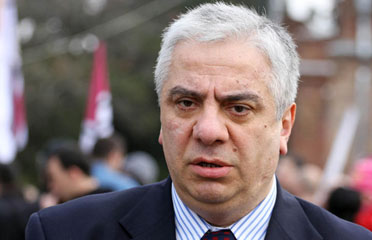
| Giorgi Chanturia. Photo: InterPressNews |
Chanturia, once an influential figure in ex-president Shevardnadze’s administration, was head of the Georgian International Oil Corporation (GIOC) for nine years, before September, 2004. He was in charge of negotiating and implementing the construction of the Baku-Tbilisi-Ceyhan oil pipeline and Baku-Tbilisi-Erzurum gas pipelines.
Chanturia says that he does not view the Tbilisi mayoral post as a political position. He even said that he was “neither opposition, nor pro-government” figure at all.
Chanturia has not been engaged in Georgia’s political or public life since September, 2004 when he was dismissed from the post of president of GIOG by President Saakashvili. He then left the country and worked in Azerbaijan for several years. His departure triggered speculation that he had to flee the country facing possible arrest; for some time he even was in Interpol’s wanted list. Chanturia, however, strongly denies rumors that he had to flee the country. He said in February, 2010, that his departure from the country was solely related to his professional activities and that he worked for almost three years in Azerbaijan on a project related on involvement of Kazakhstan in Baku-Tbilisi-Ceyhan oil transpiration route. He also said that in his capacity, while working on this project in Azerbaijan, he had regular contacts with the Georgian authorities.
Chanturia runs the campaign with a message: “Low tariffs and employment”.
He promised voters, that in case of election he would cut gas tariff from current GEL 0.51 for households per cubic meter to GEL 0.1 and would reduce electricity tariff, which now varies from GEL 0.135 to GEL 0.177 (depending on amount of consumed electricity) to GEL 0.05.
Chanturia says that reduction of gas tariff is possible thanks to Georgia’s role in Shah Deniz gas project from which the country, as a transit route, annually should receive 5% of transited gas free of charge and in addition 500 million cubic meter from transited gas with reduced price of USD 55 per 1,000 cubic meter.

 RSS
RSS Mobile
Mobile Twitter
Twitter Facebook
Facebook